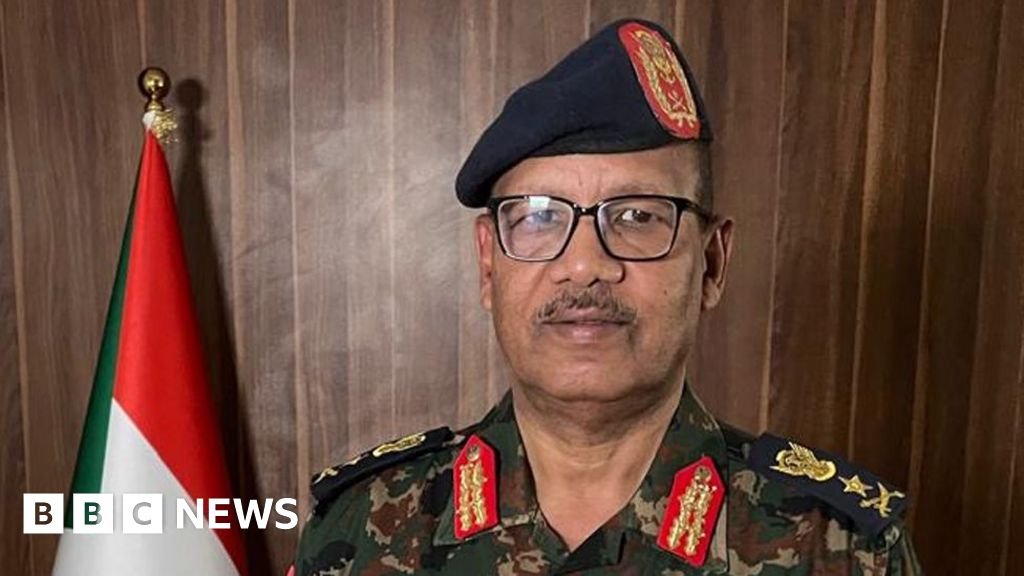A senior Sudanese general said the army would continue its offensive despite international efforts to broker a ceasefire in the 17-month-old civil war.
Assistant Commander-in-Chief of the Armed Forces, Lieutenant General Ibrahim Jaber, told the BBC: “Peace talks can continue, but the army will not stop there.”
He was speaking just days after the army launched an operation to regain control of the capital, Khartoum, from the paramilitary Rapid Support Forces.
Fighting has been going on between the two sides since April last year, when their leaders disagreed over the future of the country. This has led to a humanitarian catastrophe with more than half the country facing hunger and millions forced from their homes.
The general also hinted in the wide-ranging interview that Sudanese authorities had arms dealings with Iran, and denied that there was a famine in the country.
“When both parties agree [to a ceasefire]He said: “The army can stop,” reiterating the army’s demands for the withdrawal of the Rapid Support Forces from the areas they occupied.
“Let the international community put pressure on the militia to stop fighting and leave the homes it seized,” he said, adding that he was “more confident” now that the army had the momentum.
US envoy to Sudan Tom Perriello admitted this week that new diplomatic attempts to negotiate a cessation of hostilities had failed to make progress.
“The situation is absolutely dire and those who are in the best position to stop it seem keen instead to accelerate it,” he told reporters in the Kenyan capital, Nairobi.
He noted some improvement in humanitarian access, noting that a few hundred trucks loaded with aid were able to reach areas that were previously off-limits.
“But clearly we need to be on a completely different scale than that,” he added.
For several months, the army prevented the shipment of aid through an important border point controlled by the Rapid Support Forces between Chad and Darfur. In August, it agreed to allow its resumption, and the Rapid Support Forces promised to facilitate handovers in areas it controls.
Major General Jaber denied allegations that the army is still slow in approving the necessary paperwork for humanitarian groups, which has led to a reduction in the number of visas and permits issued.
He confirmed that the Rapid Support Forces looted humanitarian goods, and are still preventing aid from entering the besieged city of El Fasher in North Darfur state.
The army repeatedly denied the existence of famine in the country, and once again blamed the Rapid Support Forces for the hunger crisis.
In August, a UN-backed group of experts concluded that famine conditions existed in the Zamzam camp for displaced people outside El Fasher. She was able to make the decision because she had the data to do so, but she said other parts of Sudan were also at risk.
But the Sudanese government has not made a formal famine declaration, which could trigger a UN Security Council resolution to enable agencies to provide cross-border relief.
The army focuses on Darfur’s border with Chad because it says it is a corridor for mercenaries and weapons supplied to them in particular by the United Arab Emirates.
General Jibril said the UAE’s alleged support for the RSF “makes a huge difference in fighting the war.” “Because the Rapid Support Forces are a militia, and they are supported by advanced, high-tech weapons. But in the end, they will not win the war, as this is a militia.”
The UAE denies providing such support to the Rapid Support Forces, but the United Nations says there is reliable evidence.
A recent investigation published in The New York Times provided extensive details.
A report by New York-based NGO Human Rights Watch documented visual evidence of weapons from the United Arab Emirates, as well as from China, Iran, Russia and Serbia, with manufacturing dates dating back to last year.
General Jaber indicated that the army discussed purchasing weapons with Iran.
“You can find weapons if you have money and facilitate payment,” he said.
He added: “Iran will not give you any weapons unless you pay in cash. And we have no money… The most important thing is that we are a government, and we have the right to deal with everyone.
The general denied accusations of war crimes contained in a recent UN report, which cited evidence of indiscriminate bombing, attacks on schools and hospitals, arbitrary detention and torture.
He said: “The Sudanese army is not angels.” “They can commit crimes, but I’m talking about individuals.”
He would not risk predicting how long the war might last—another Sudanese defense official cited, by comparison, America’s twenty-year-old battle against the Taliban in Afghanistan when asked.
All previous Sudanese civil wars have lasted many years, says Sudan War Monitor, a group of researchers tracking the conflict.
“The main factor that makes this war so protracted is that Sudan is a huge country and both warring parties are large, making it impossible for any one battle to determine the outcome of the war,” she told the BBC in an email.
For General Jaber, the endgame was clear: “Sudan will win, and Sudan will be rebuilt.”











